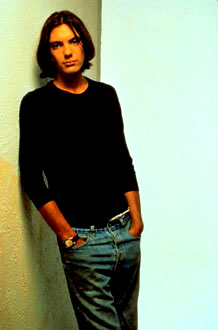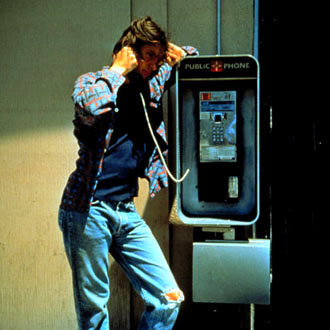
(Note from the Grand Panjandrum: this review was REALLY thrashed while being uploaded, so you may want to look at the First Look Pictures johns link. 5 May 1999: As of today the official site's sound and video clips from the film were no longer operating, so we have added some stills from the offical site while they were still available. They are, of course, all ©1997 by First Look Pictures.)

From its opening minutes to its closing seconds, the recently released film, johns, unfolds like a Greek tragedy. The viewer is swept along relentlessly through twenty-four hours in the life of John (David Arquette, in what is probably his best work to date) and his friend, Donner, a doe-eyed Lukas Haas, as sad and tragic as Bambi). John, with Donner's dubious assistance, spends Xmas Eve trying to hustle up (literally) enough money to fulfill his wish to spend the night at the best hotel in the city as a twenty-first birthday present to himself.
But, like all tragic heroes, John has a fatal flaw: his utter dependence upon his lucky sneakers and the hundreds of dollars in cash which he keeps in them, saved up to pay for his night at the hotel. The sneakers and the money are stolen as the film begins, and John finds that without his "lucky sneaks," which have brought him good luck for two years, his luck has run out.
After failing to catch the fleeing thief, John is informed that "Jimmy the Warlock," (Terrence Dashon Howard of Sparks in a truly creepy performance) is looking for him . . . and the three hundred dollars in drug money which John ripped off from him and from the ominous, unseen "Popeye," whose spectre hangs over the streets like that of Keyser Söse in The Usual Suspects.
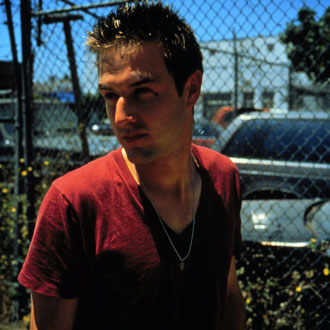
John is torn in many directions as Christmas Eve unfolds: Donner, tries to help him raise money for the hotel, but also wants him to come with him to waiting jobs in Branson, Missouri; John's angry girlfriend, Nikki, wants him, period; he keeps crossing paths with the apparently mute, Christ-like figure of Homeless John (Keith David), and through it all he must placate the hotel's concierge, Paul, played with grace and sensitivity by Richard Kind, who is best known as the oafish press secretary on Spin City.
As if to underscore the dark theme that the only friend a street person has is the money in his pocket, the increasingly frustrated John finally pounds Donner in an alley. After Donner is beaten again (his third time in twenty-four hours!), the two reconcile, and attempt to fulfill all of their dreams by avoiding the mysterious Popeye, spending the night at the hotel, and leaving in the morning for Branson.
Unfortunately, Jimmy the Warlock gives John a midnight deadline to pay the money which is due to Popeye. This leads to a very poignant scene between the ragged John and the elegant Paul in the hotel lobby.
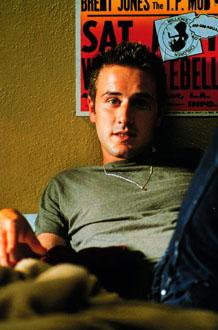
Desperate, John stops at nothing to raise his share of the bus fare, and when he meets up with Donner later that evening, he is surprised to find that Donner has a lot of cash and a big secret, a secret which he does not have a chance to share with John before John decides to go on a final Christmas Eve "date" to raise $200 extra for the trip to Branson.
As the film draws to its surprising conclusion, we hear a soulful Christmas blues song which summarizes the tragedy of these street people, one of many songs by blues great Charles Brown and co-composer Danny Caron, whose work ornaments the film.
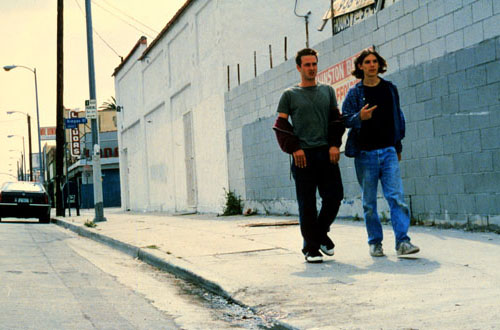
johns grew out of writer-director Scott Silver's first Christmas in Hollywood, when he was lonely and alone, the temperature was in the nineties, and the only people who seemed to be more miserable than he was were the homeless kids whom he saw on the streets. Working with Director of Photography Tom Richmond (probably best known for his work on Little Odessa, Love and a .45, Pearl Jam's video "Jeremy," and MTV's "Zoo TV"), Silver "blew out the sky" by overexposing the film, giving johns the look and feel of the most miserable summer day in L.A. (the sort that frequently occurs around Yuletide); it is not film noir, it is film blanc. Watching it, I was forced to think of Oran in Albert Camus' The Plague, or (vanity of vanities) my own poem, "Death in a Dry Place." The dirt and grit and squalor are real: the film was shot entirely on location in and around Hollywood. The dialogue and violence, the duplicity and the pain are also genuine: Silver paid many street kids to tell him their stories, apparently with greater success than most documentary journalists; nothing is softened up or watered-down or washed in maudlin, made-up lies in johns; it's the real thing.
Fortunately, johns is not pure pain and suffering: there are many genuinely funny moments in it. The film is obviously not for everyone, though: film purists may be jarred by the hallucinogenic, Eisensteinian editing of John's fantasies when the same technique is used with the very down-to-earth characters of Donner and John Cardoza (Arliss Howard), some people might object to the subject matter, while the violence, strong language and adult themes merit the film's "R" rating this is definitely not a film for young children. However, despite what one might expect, there is no nudity in johns, which may be a plus or minus, depending upon your point of view. ;-)

(Yet another note from the Grand Panjandrum: the Shea-man insisted that we include links to Lukas Haas in Boys,, a movie which he trekked half-way across Los Angeles County to see {the day before it closed}, and Mars Attacks! which he got to see for free and, therefore, loved. We shall indulge him on this since his review was trashed by the computer. Oh, and since he is in a major snit, he insists that we mention that Boys, the movie, was NOTHING like "Twenty Minutes," the story upon which it is allegedly based. We have advised him to take a purgative and get some sleep.)
